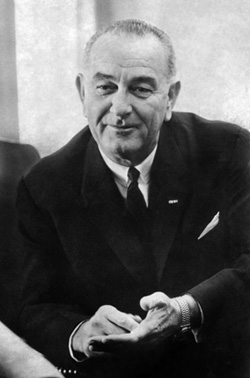?/?
books
?:?
Reading between the lines.Updated Monday, June 13, 2011, at 6:48 AM ET President Lyndon Johnson, domineering and manipulative, lives on in American memory as the classic power broker. He bullied opponents, sweet-talked skeptics, and chewed out subordinates. He oozed confidence as he passed one piece of landmark social legislation after another, even as his cockiness helped to mire the country in Vietnam. Yet this is not the Johnson who emerges from volumes seven and eight of The Presidential Recordings, a transcription of his phone conversations from June 1 to July 4 of 1964.
President Lyndon Johnson, domineering and manipulative, lives on in American memory as the classic power broker. He bullied opponents, sweet-talked skeptics, and chewed out subordinates. He oozed confidence as he passed one piece of landmark social legislation after another, even as his cockiness helped to mire the country in Vietnam. Yet this is not the Johnson who emerges from volumes seven and eight of The Presidential Recordings, a transcription of his phone conversations from June 1 to July 4 of 1964.
The power broker was in top form at the beginning of this five-week span, guiding the Civil Rights Act through a divided United States Senate. By the end, the master politician was plotting his re-election campaign. But in between, we hear Johnson's voice hitting unfamiliar registers?this collection also includes a DVD with audio footage?as it crackles across the decades.
Five days after the assassination of John F. Kennedy, Johnson committed himself to a strong civil rights bill. Scholars have depicted this as a defining moment in his presidency. The native Texan wanted to show skeptical Northern liberals that he stood tall for racial equality. Just as crucial, Johnson was driven by ambition. He believed that passage of this bill would help secure for him a grand legacy.
According to the legend, Johnson admitted to White House aides that his signing of the Civil Rights Act would hand the South to the Republican Party for generations to come. It was a high price, but one that Johnson was willing to pay. This prediction has become a central part of the Johnson story. Historians, drawing on memoirs of White House insiders, retell this story with reverence in the way that relatives pass down cherished pieces of family lore. The Democrats thus became the party of racial progress; the Republicans seized the South. The story remains so powerful because Johnson gazed far into the future, foreseeing those political maps of America that would color entire regions in red or blue.
To hear Johnson's phone conservations from these five weeks is to reconsider the received wisdom and appreciate how a proliferation of events threw him off balance. Here we have the immediate record; the muck of history has yet to be tidied. Over the course of these five weeks, Johnson's historical legacy became the least of his concerns. And he remained intent on winning the votes of white Southerners. In retrospect, it all looks like a succession of decisive turning points. At the time, however, Johnson realized he was scrambling to adapt to volatile circumstances.
Johnson was neither the first president to tape his White House conversations nor the most thorough. Franklin Roosevelt, Harry Truman, and Dwight Eisenhower all recorded selected discussions. John F. Kennedy installed an elaborate taping system and made liberal use of it. Of course, Richard Nixon went the furthest, taping thousands of conversations. Lyndon Johnson relied on Dictaphone equipment to record many of his own phone conversations. The occasional office meeting was also recorded when the speakerphone?Johnson's "squawk box"?remained active. We are now flies on history's wall.
On June 10, 1964, the United States Senate voted to end debate over the Civil Rights Act. This halted the longest filibuster in Senate history and ensured the law's eventual passage. Johnson rammed this bill down the throats of his fellow Southern Democrats. It was his greatest victory to date. But tragedy overshadowed triumph. Before Johnson signed the bill into law, three civil rights workers disappeared in Neshoba County, Miss. Suddenly, Johnson found himself trying to navigate a treacherous terrain?one that included a murderous Ku Klux Klan, callous Mississippi politicians, a galvanized civil rights movement, and grief-stricken parents.
The world of Washington politics was Johnson's comfort zone; the racial violence in Mississippi thrust him into an entirely different realm. He had to marshal emotion and adjust to explosive events rather than to amass power and count votes. "This Mississippi thing is awful mean," he admitted to Richard Daley (Chicago's mayor) on June 29. "I don't know what in the world is going to happen."
 Johnson learned on June 22 that James Chaney, Andrew Goodman, and Mickey Schwerner were missing in the Magnolia State. He gathered the facts from FBI head J. Edgar Hoover, and began to phone Mississippi's elected officials. He attempted to balance many cross-pressures. Johnson looked ahead to the passage of the Civil Rights Act, hoping that white Southerners would comply with the new law. He feared a replay of Little Rock or Ole Miss. "I'm not going to send troops on my people if I can avoid it," Johnson told Secretary of Commerce Luther Hodges. To promote peaceful compliance, he tried to find his way into the good graces of white Southern leaders?the very leaders whom he had just defeated on the Senate floor.
Johnson learned on June 22 that James Chaney, Andrew Goodman, and Mickey Schwerner were missing in the Magnolia State. He gathered the facts from FBI head J. Edgar Hoover, and began to phone Mississippi's elected officials. He attempted to balance many cross-pressures. Johnson looked ahead to the passage of the Civil Rights Act, hoping that white Southerners would comply with the new law. He feared a replay of Little Rock or Ole Miss. "I'm not going to send troops on my people if I can avoid it," Johnson told Secretary of Commerce Luther Hodges. To promote peaceful compliance, he tried to find his way into the good graces of white Southern leaders?the very leaders whom he had just defeated on the Senate floor.
Johnson also had the November election on his mind. A showdown with Republican Barry Goldwater loomed. And Goldwater, with his resistance to the Civil Rights Act, had targeted the votes of white Southerners. Johnson still thought he might keep the old Democratic coalition from unraveling. This grew more difficult by the day.
The depths of white Southerners' hostility can startle the 21st- century ear. Johnson himself was caught off guard by the extent of their intransigence. He made a show of appearing sympathetic, while never taking their views seriously. On the afternoon of July 23, Johnson asked Mississippi Sen. James Eastland what could be done about the civil rights workers. "I don't believe there's three missing," Eastland boldly responded. "I believe it's a publicity stunt." Eastland explained why the reports out of Philadelphia, Mississippi were false. "There's not a Ku Klux Klan in that area," he asserted in a high-pitched Delta accent. "There's no organized white man in that area." He wondered, "who would?could possibly harm them?" Johnson often replied "mm-hmm" to such claims, careful not to betray his own views. (You can listen to the audio clip at the end of the piece.) He quickly realized that he would receive no cooperation from this quarter. Eastland would not even grant the premise of his phone call.
Like Slate Culture on Facebook. Follow Slate on Twitter.
Source: http://feeds.slate.com/click.phdo?i=cd7aa7c243bcefdde3982bff998f28e3
d day apple news anthony weiner mac rumors ios 5 gizmodo mls listings
No comments:
Post a Comment
Note: Only a member of this blog may post a comment.